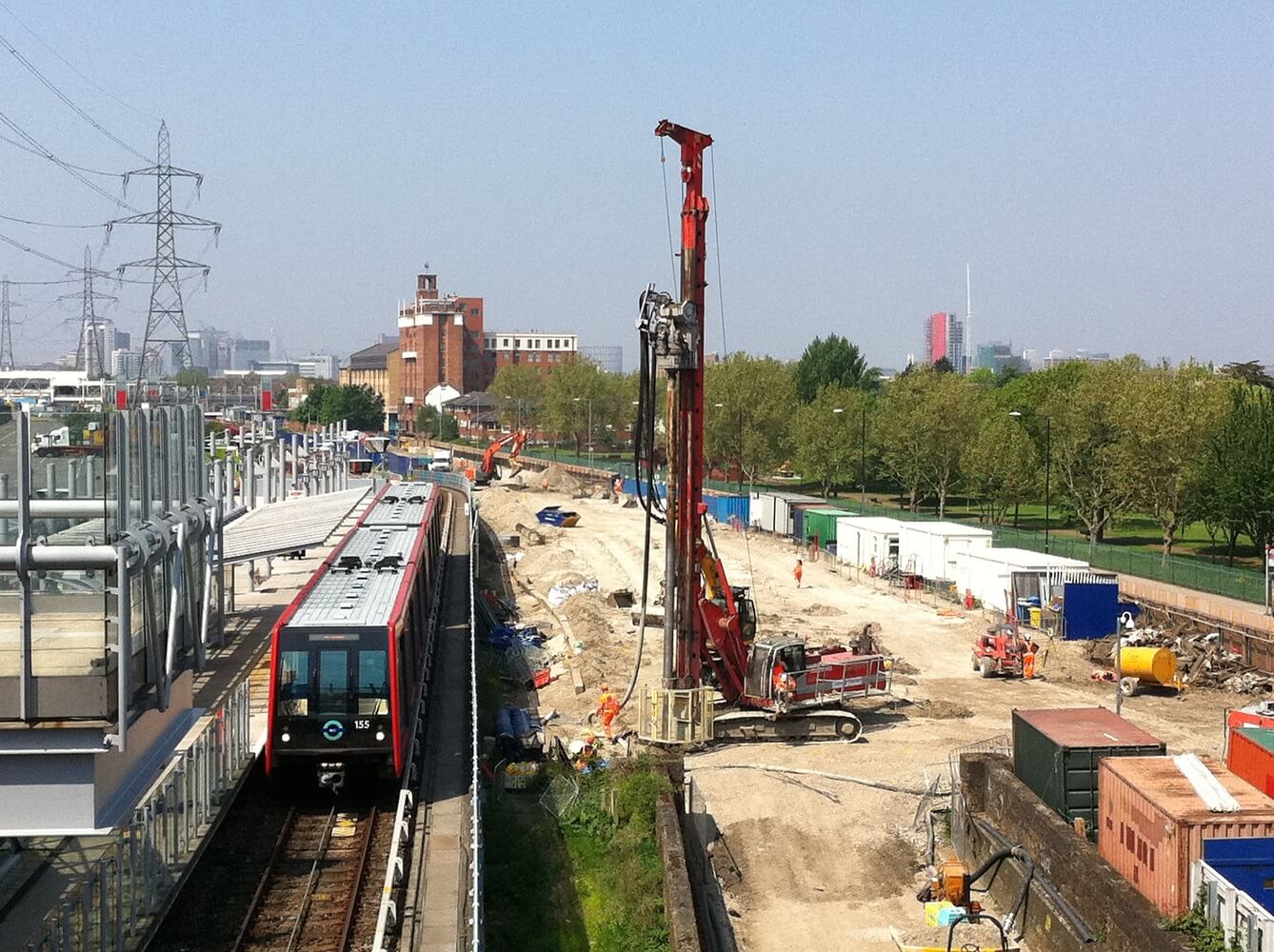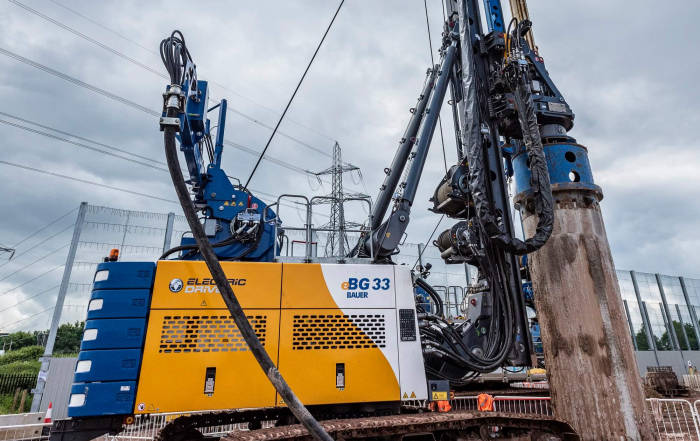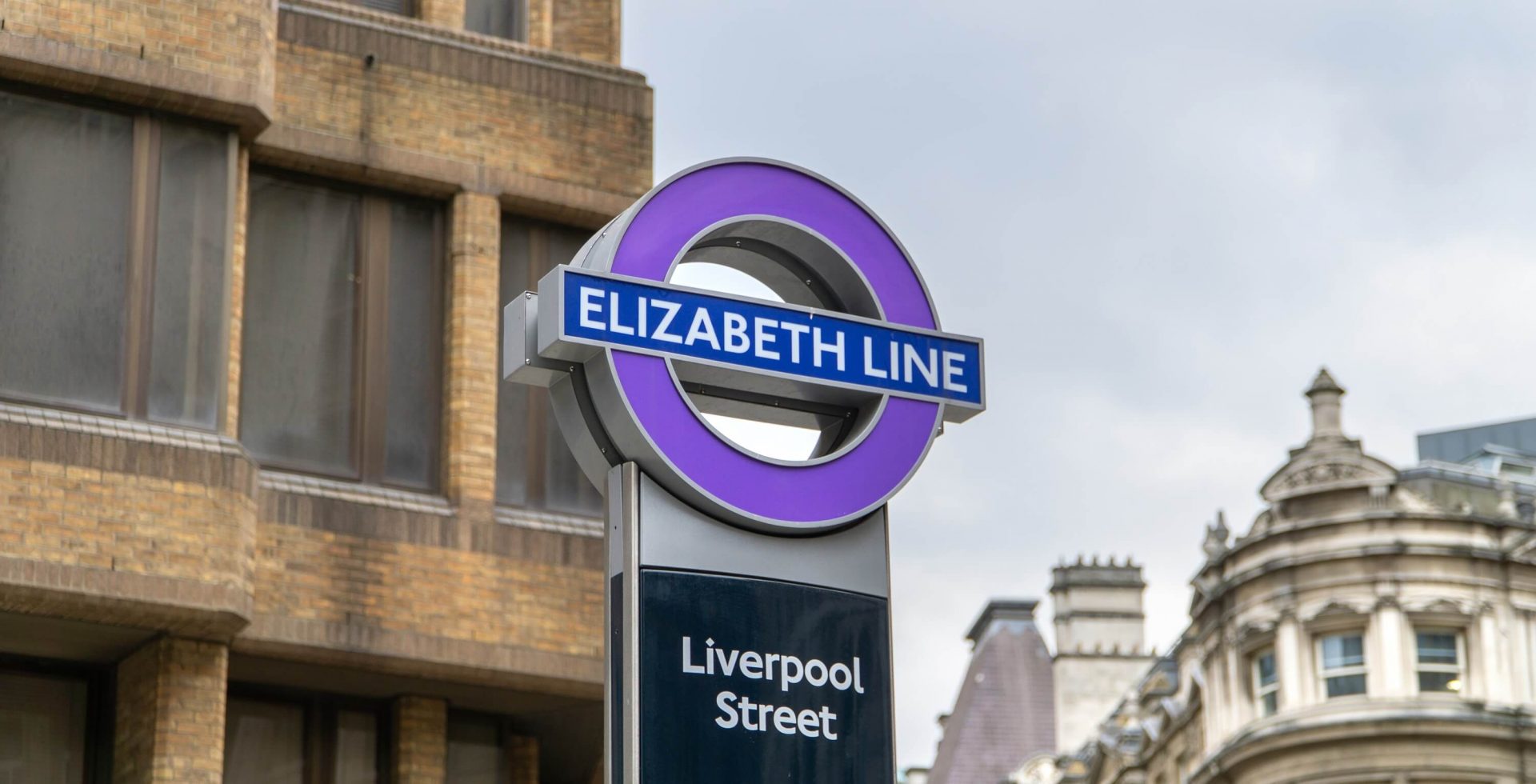
Today marks the official opening of the Elizabeth line. In this article, we look back at Bachy Soletanche’s contribution to what is more commonly known in the construction world as Crossrail. The Elizabeth line is a new railway route providing faster and more direct connections across London and beyond. The 100km-long line stretches from Reading and Heathrow in the west to Shenfield and Abbey Wood in the east, featuring a total of 41 accessible stations.
Working on the largest infrastructure scheme in Europe was a significant moment for Bachy Soletanche, who was contracted to deliver the ground engineering works for eight of Crossrail’s project sites, including seven Elizabeth line stations.
Across these schemes, our teams pushed their ground engineering expertise to the limit, performing a vast array of complex techniques and collaborating with project partners to design and deliver innovative geotechnical solutions. In this brief overview, we reflect on some of the standout moments and unique challenges from our time working on the Crossrail scheme.
C510 Liverpool Street Station
Bachy Soletanche successfully delivered a 60-month-long compensation grouting scheme to mitigate tunnelling-induced settlement from the Liverpool Street Station platform tunnel works carried out by its JV partner, BBMV (Balfour Beatty, BeMo Tunnelling, Morgan Sindall and VINCI Construction Grands Projets). Bachy Soletanche injected over 7,500,000 litres (the equivalent of three Olympic sized swimming pools!) of blended cement/PFA grout into the ground via a 12,000m network of Tube-a-Manchette boreholes. To implement the works, the team constructed two grouting adits 15m below ground level, totalling 200m in length, which provided a 15% reduction in the length of the original Finsbury Circus grouting array, thus affording valuable environmental, cost and time savings.
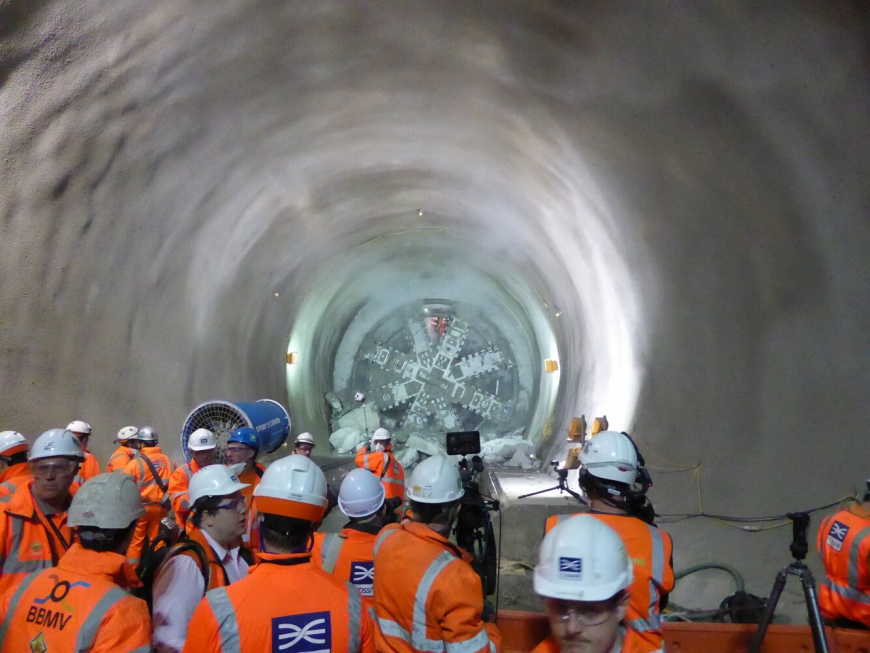
C336 Paddington New Yard
Working on behalf of Costain, Bachy Soletanche delivered 162 cased secant piles, 317 LDA piles and 97 SolThread piles for Paddington New Yard and its facilities. The LDA piles included 51 restricted access mini piles, which were installed under the elevated A40 Westway with a working height of only 5m. Bachy Soletanche’s innovative SolThread technique increased pile capacity by 40% due to the increased skin friction provided by the pile’s threaded shaft. The technique also significantly reduced cost, programme time and greenhouse gas emissions thanks to the piles’ small diameter.
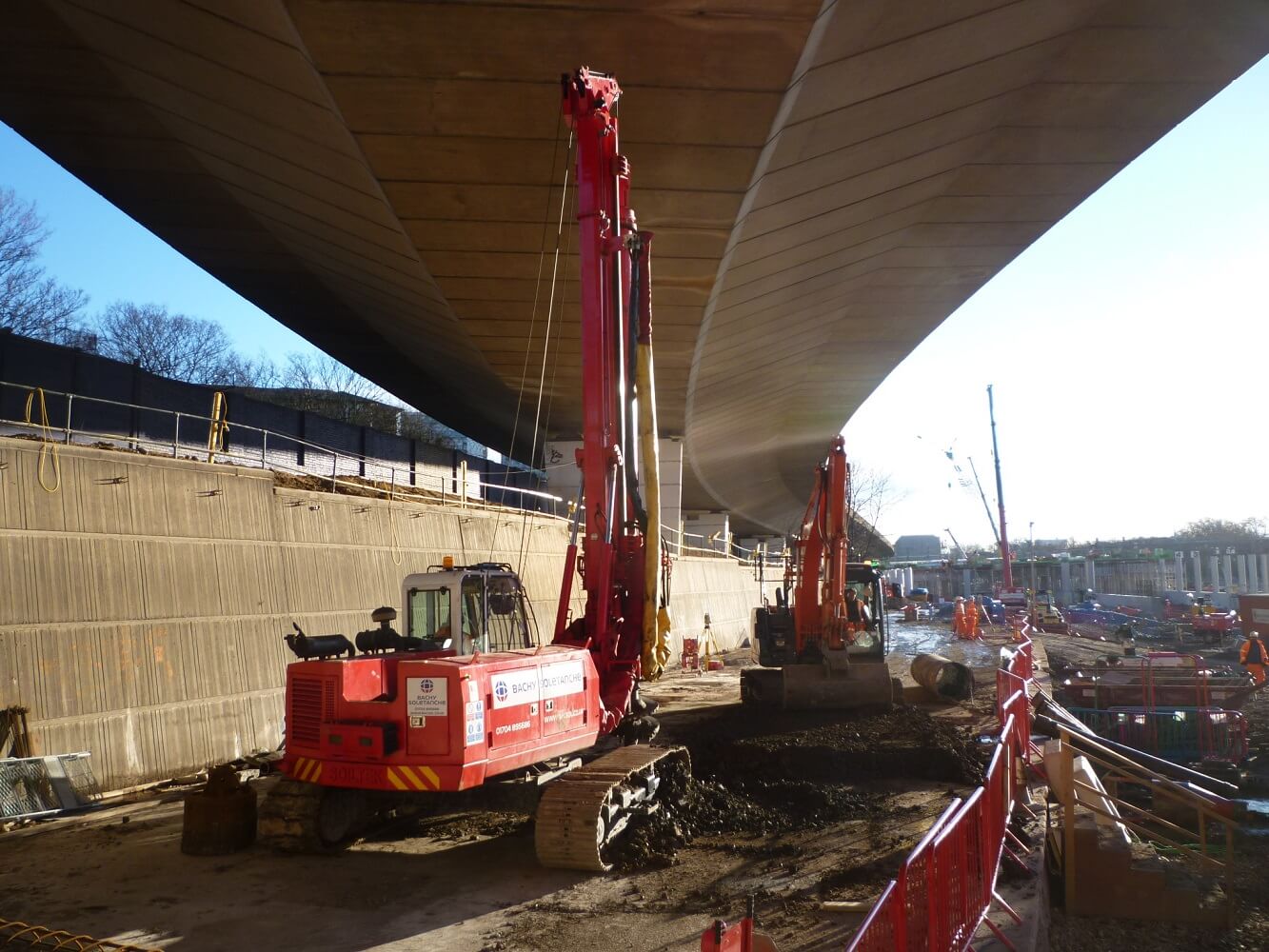
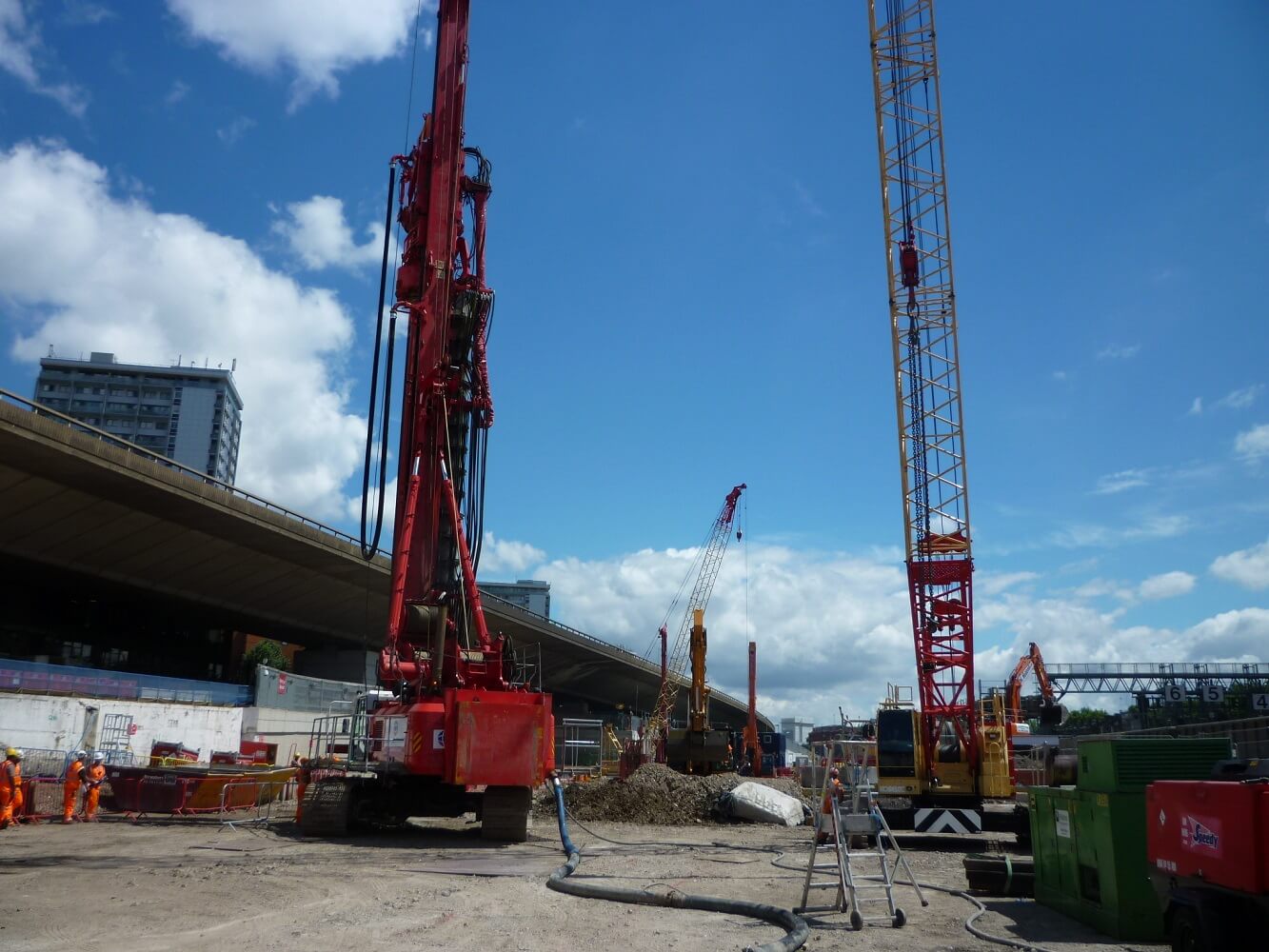
C512 Whitechapel Station
Bachy Soletanche constructed 424 piles ranging in diameter from 140mm – 600mm, including tension piles and piles for a secant and contiguous wall. The company also designed a complex reticulated wall for a bridge removal. To meet the expectations of a revised programme and facilitate the complex handover of site areas, the C512 Whitechapel team collaborated with the C510 BBMV team to create additional access shafts that connected to the Whitechapel Station platform tunnels. This involved Bachy Soletanche constructing the shafts in the form of two boreholes, each comprising 2m diameter segmental casing that was installed to approximately 23m below ground level – a task that had never knowingly been attempted before in the UK.
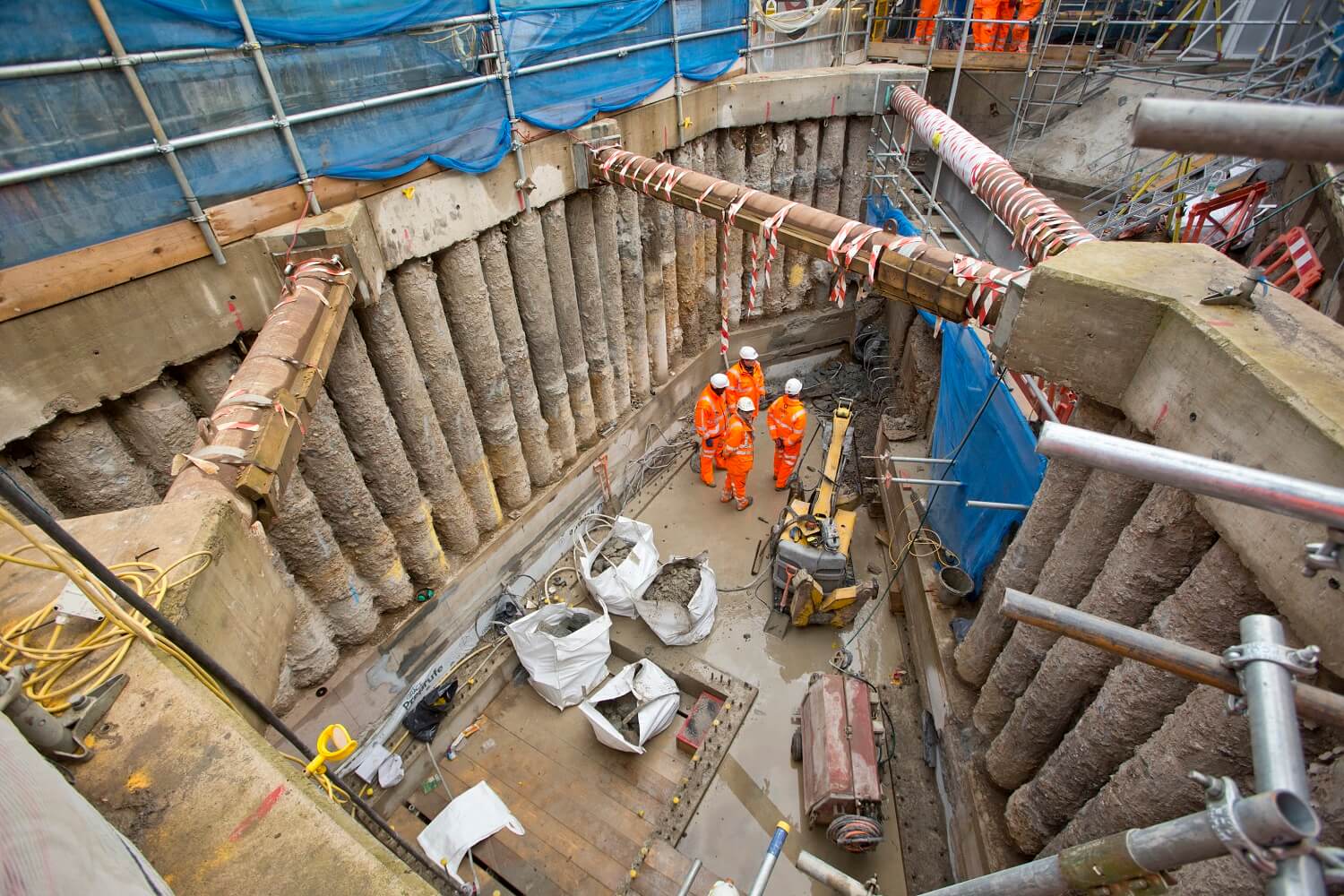
C410 Tottenham Court Road Station
In joint venture with Balfour Beatty Ground Engineering (BBGE), Bachy Soletanche delivered an extensive programme of piling and diaphragm wall installation in an urban environment next to the busiest shopping street in London. The team installed 39 piles (1,800mm dia., up to 44m deep) followed by a 221m-long and 1,000mm-thick diaphragm wall, which comprised 63 panels that ranged in depth from 18m – 41m. Bachy Soletanche fitted a series of geothermal loops into 45 of these diaphragm wall panels to facilitate ground source heating and cooling. This was the second project in the UK where a geothermal system had been used on a diaphragm wall and, along with reducing future energy use, it cut the project’s carbon emissions by 20%.
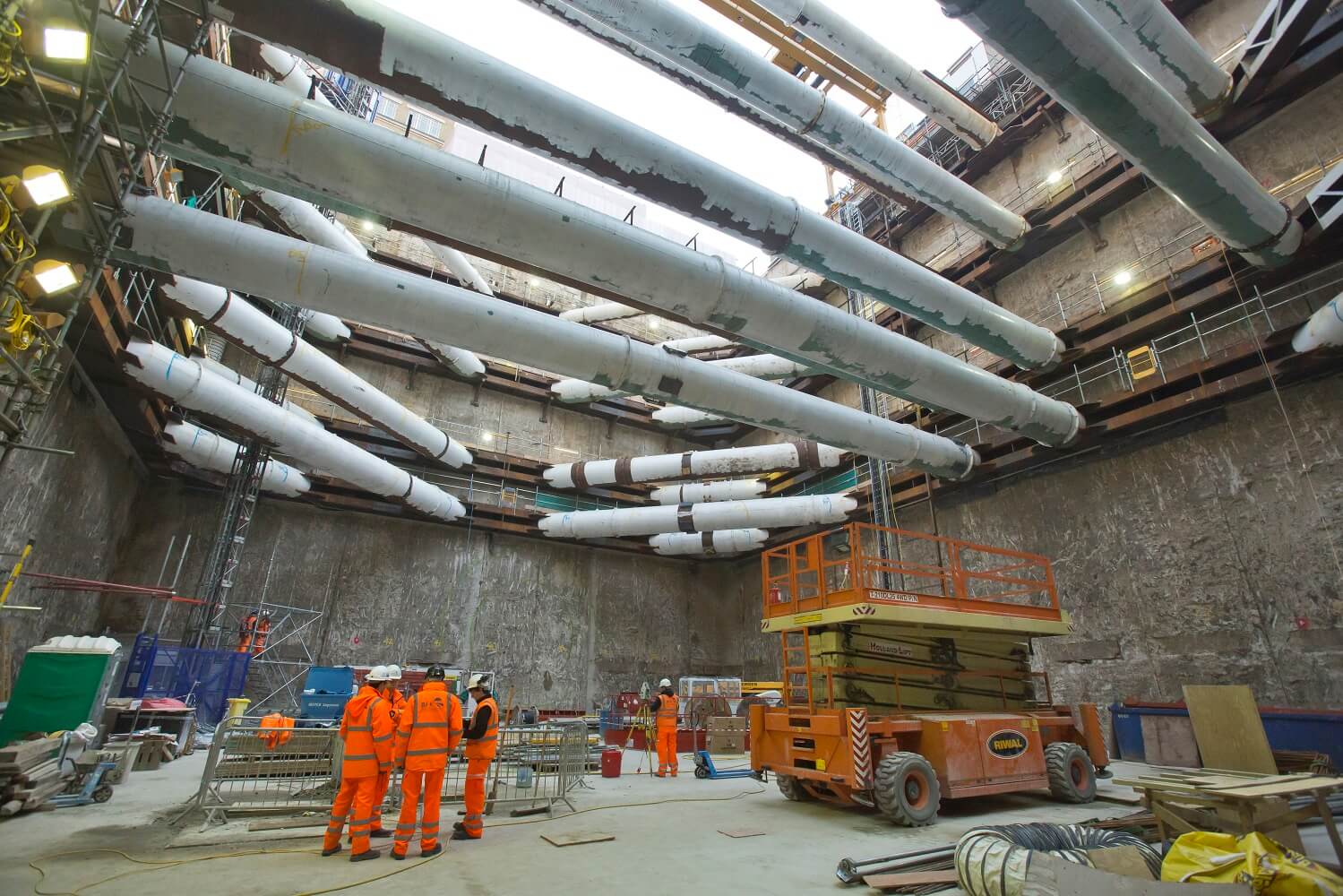
C340 Victoria Dock Tunnel Portal
To support the construction of the new Victoria Dock Tunnel Portal, Bachy Soletanche installed a 175m-long, 18m-wide secant walled box. This was formed of 382 secant piles that ranged from 1,180mm-1,200mm in diameter and were installed to an average depth of 19m using a combination of CFA and LDA piling techniques. Alongside the secant wall work, the team constructed 348 CFA tension piles for the base slab. The Victoria Dock Portal was one of the most logistically challenging of the Crossrail sites as Bachy Soletanche had the task of fitting three large piling rigs, two heavy-duty telescopic crawler cranes, three excavators, concrete trucks and other ancillary equipment on a site that was just 12m wide and situated adjacent to the live Docklands Light Railway (DLR) lines.
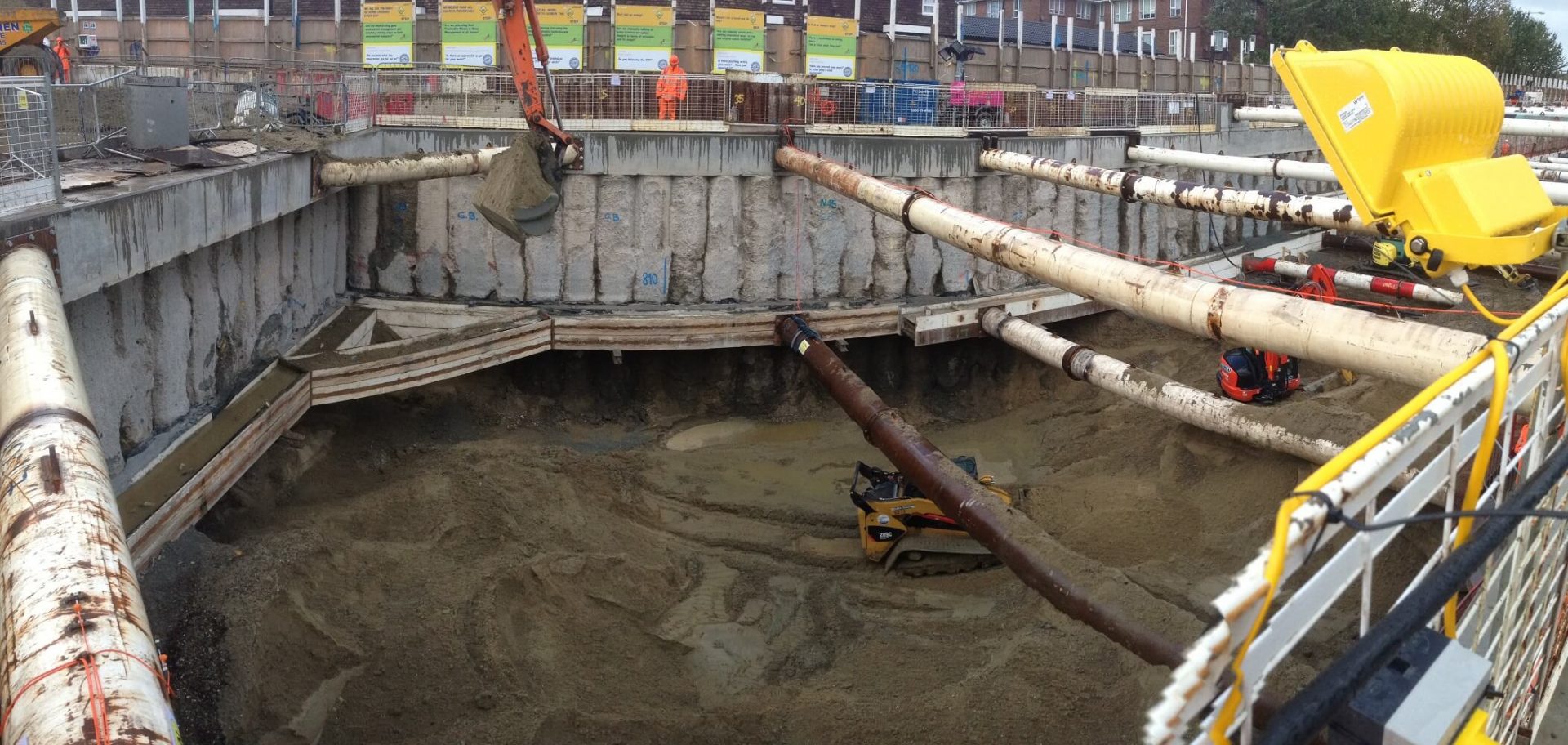
C350 Pudding Mill Lane
To support the construction of the new DLR station at Pudding Mill Lane, Bachy Soletanche conducted an intensive piling programme adjacent to live rail assets. The team installed 41 rotary bored piles with segmental casing and bentonite fluid, a 95m-long diaphragm wall, 1,162 CFA piles, and a Hard/Hard secant wall comprising 282 reinforced cased secant piles. This was the first time Bachy Soletanche had installed cased secant piles of this diameter to this depth, which required them to hire the largest rig available in the UK at the time: the Bauer BG46. Due to poor ground conditions, Bachy Soletanche spent extensive time with London Concrete developing a high flow concrete supply that included plasticisers to prevent segregation and offered a 5-hour workable life.
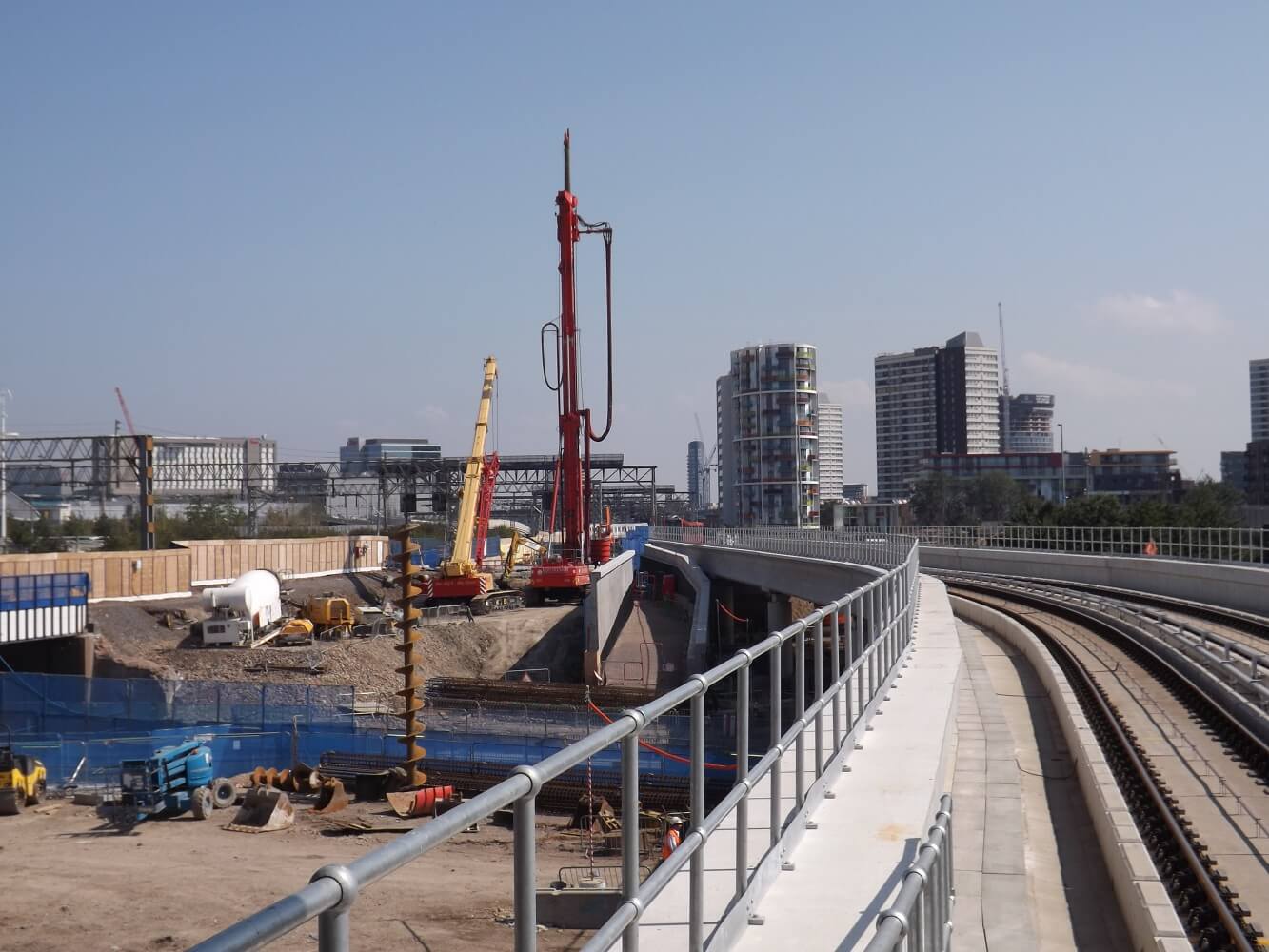
C503 Liverpool Street Station, EDF Power Link Substation
To support the Crossrail enabling works at Liverpool Street Station, Bachy Soletanche installed two Hard/Firm secant piled walls that spanned a total of 60 linear metres and were constructed using the large diameter auger (LDA) piling method. The pile diameters ranged from 750mm to 1,200mm, and the maximum depths from 21.5m to 35m. The team had the challenging task of installing piles in a backfilled basement, as well as operating in a confined site within close proximity to live London Underground lines.
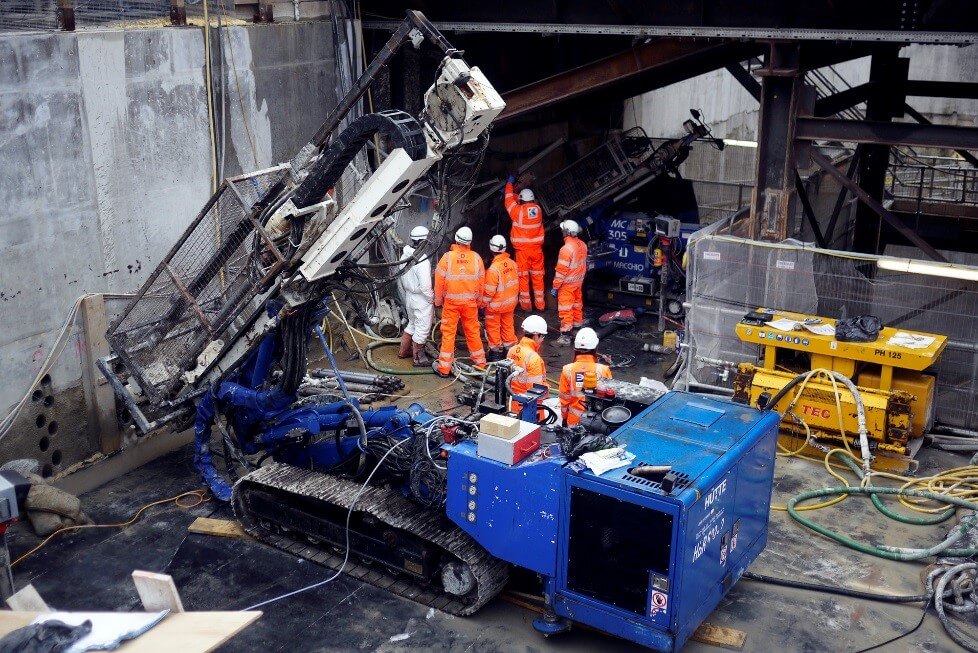
C315 Connaught Tunnel
Working on behalf of VINCI Construction, Bachy Soletanche delivered an innovative permeation grouting programme to enable the expansion of the 134-year-old Connaught Tunnel. The team installed three-metre-long steel Tube-à-Manchette (TAM) pipes to deliver phased injections of two grout mixes: cement bentonite and microfine, which reduced the permeability of the unconsolidated ground. Bachy Soletanche modified the TAMs to become ‘self-drilling’, which enabled them to start injecting immediately after being placed in position, providing an innovative and more efficient solution to the traditional method. Due to dangerously high ground water pressure, water inflated bags were attached to the top of the TAMs to seal them within the brick liner, which reduced the risk of water ingress.
